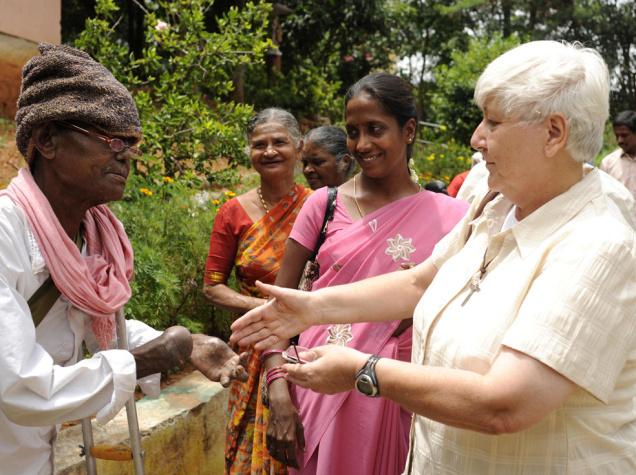Bihar Anjuman believes in self-help rather than charity
Related Materials
Abul A'ala Maududi: Towards Understanding Islam
Download: Prophet's Prayer
PEACE TV
SHAREISLAM TV
TARAWEEH TV
ISLAM CHANNEL
Video: Prophet's (PBUH) prayer
Video: Performing Wuzu (Wudhu)
Prophet's (PBUH) Prayer, by Shaikh Muhammad Naasir-ud-Deen Al-Albaani
The Treaty of Hudaibiya
Islamic Art of Living: Presentations
Islamic Art of Living (manners from Quran)
Audios from 163 Islamic Scholars
Islamic Articles
Islamic Personality (Series)
A Guide to Islam for non-Muslims
Mother's Day, Father's Day ... for us it's everyday
Muslims must be MODERATES only
Muslim Marriage Guide
Hajj & Umrah Made Simple (Urdu/ Hindi)
Handbook of Umrah-Hajj
Hajj: Quick Reference Book
Pictorial guide to Hajj Route
Change Hijri dates to Gregorian and Gregorian into Hijri dates
A Collection of Useful Articles
by
Shakeel Ahmad When
we talk of Islamic Dawah (inviting people to Islam), what do we really
invite them to? Surely, to the five pillars of Islam! What are these
five pillars for? Nobody should doubt the importance of these pillars,
which serve as a strong support-base for the building that the invitee
will ultimately construct over these pillars. Are pillars, alone,
enough, for a building – a contractor once told me he was not
interested in executing building contracts because they have hundreds
of items to do? Hundreds of items, but just a few pillars! Pillars of
Islam purify us (faith or eiman, prayers, fasting, zakat, hajj, all of
them are just for purification, and perhaps no more), build our
character, and prepare us for carrying out the responsibilities of a
Muslim. Only water can quench our thirst, and only Oxygen can keep us
alive – that is the mechanism devised by Allah. Similarly, we can
become capable of fulfilling our responsibilities, and delivering
acceptable results, only when we purify ourselves through the five
pillars of Islam. By any means, can these pillars alone truly justify
the purpose of our existence? Imagine
an engineer who spends sixteen years in preparing himself,
academically, to deliver some tangible products to the society, finally
spends just praying and fasting, confining himself to a room, doing no
work at all! Of course, zakat may not be due on him, nor is Hajj
obligatory on him, because he does not earn anything. Are the resources
of the society spent on preparing this Allah-fearing person, to bring
about some good to the society, well-spent? He says this is the only
way to bring him spiritually closer to the Almighty, and to purify him.
I guess some of you would consider this as a subconscious attempt at
committing suicide, since he will not even be able to earn a living for
himself. There is, of course, no question of raising any offspring or
earning a living for his family. Is he anywhere closer to the teachings
of Islam? A Muslim is not allowed to live a life of seclusion, his
spiritual closeness to Allah comes through the efforts he makes towards
the zikr, prayers, fasting, giving away zakat (earn so that he may pay
sadaqah and zakah), and do good deeds. Will
Allah not ask what we did in this world, other than worshipping Him
[please check Quran, 17:36, for an answer]? In His Book of guidance
(Quran) - the operations manual for technical people, like me, Allah
commands us to race with each other in performing good deeds [Quran,
5:48]. Throughout
this operations manual, we are urged and commanded to do good deeds
[e.g., in Quran, 2: 25, 2: 62, 2:82, 2:110, 2:215, 3:57, 3;172, 4;16,
4:124, 4:146, 4;149 …. - we have just covered four Surahs] - and this
is apart from giving away part of our earnings in charity (sadaqah or
zakat). We are urged to establish a system that can impart justice,
promote peace, goodwill, and everything that is good, and stop all that
is evil (Quran, 3;104, 3:110, 3;114). It is not difficult to
understand, then, that the main purpose of purifying ourselves is to be
able to follow God's operations manual - act honesty on its clauses
(commandments), that is, implement them in our own lives and preach
them to others. We can clearly see that the Dawah (invitation) includes
inviting people to do good deeds, not merely to purify themselves by
following the five pillars of Islam - that is, to make the best use of
whatever talent, energy, strength, power, resources, etc., Allah has
bestowed them with. Let's now turn to the question that has been raised
in part-1 of this article: why is our Dawah ineffective (or, not as
effective as that by others)? Before we try to answer this question,
let's also keep this in mind that many of those who accept Islam
mention that they do so not because of the actions of Muslims, but
because of the inspiration and learning they receive from Allah's
operations manual. Don't
we all believe in the axiom "actions speak louder than words"? The best
way to make people understand is through action. For example, if I ask
people to do good deeds, what would they understand as "good deeds"? If
we do those good deeds as our normal way of life, and show them by way
of examples, they not only understand the term easily, but also know
that we walk our talk! If I ask my son to stop smoking because it is
harmful, but continue smoking myself, would my words be effective? Is
there an iota of doubt that my Dawah (invitation) to quit smoking would
carry no impact, and would actually be a sheer waste of my time and
effort (resources), unless I quit it myself (better still, if I have
never touched a cigarette, myself)? That's one part – preventing what
is evil. A more important part is doing something good. For example, if
I ask my son to say Salam to whoever he meets, and I don't do it
myself, would he internalize this and turn it into a habit? "Be the
change you want to see in the world", Gandhi is believed to have said,
and possibly learnt from the Quran: How
is it that you enjoin others to follow the Right Way, but forget it
yourselves, though you read the Scriptures? Have you no sense at all?
[Quran, 2:44] Now,
we invite others to Islam, areligion that focuses on spreading
knowledge, but we hardly build quality academic institutions for that!
Similarly, we invite others to Islam, a religion that focuses on caring
for all human beings, but do not build quality hospitals, do we have a
chance to be heard? If we invite others to Islam, a religion that
focuses on helping every human being through charitable deeds , but do
not have institutional mechanism to help the needy, the downtrodden,
the oppressed, those under the burden of debt (please go through the
examples of tribal areas, cited in Part-1 of the article), would people
be ready to pay any attention to our preaching? If we accept that
actions speak louder than words, we must also accept that people will
be more attracted towards those who are known to deliver the best. In
marketing terms, reputation or brand image will make the product sell
much more easily. What about the poor products, then, or the
manufacturers carrying bad reputation or poor brand value (even if they
try to deliver a quality product)? Is it any surprise, then, that we
are losing the race in the area of Dawah, as well? Coming
to how spending on Dawah may be a waste of resources, let's take the
example of a person who manages to produce an electrical bulb which
does not light up. Should we consider his efforts, and the resources
that he spent on his work, as a waste or not? If he was the person
inventing the bulb, his efforts may prove to be worthwhile at some
point of time, in the future, but if a tested technology was available,
along with an operations manual, and he did not use either of them, was
it not a waste? Some brothers are tempted to produce the argument that
results are not in our hands; therefore, we need not care for the
outcome, rather continue with our efforts. If we agreed with the
argument that results are not in our hands, what do you suggest? Should
we continue to do whatever we do, in the shoddy ways we are currently
doing? Suppose, I need to reach Chennai, and I hire a bullock-cart, do
not buy a route-map to Chennai, start my journey towards the Himalayas,
and continue with my sincere efforts to reach Chennai, will I ever be
able to reach Chennai? Allah says, don't you have sense (Quran, 2:44; 3:65; 10:16; 21:67; 28:60)?
Should we not seek knowledge, and learn the best ways of doing what we
intend to do, before we start (Quran, 17:36)? Can we justify our role
as the "best of the nations, raised for the benefit of mankind" (Quran,
3:110), by pursuing mediocrity? How long shall we remain deaf, dumb,
and blind - are we void of wisdom (Quran, 2:171)? When shall we start
applying our minds according to the Message of Wisdom (Quran,
3:58)? Write
toDawah:
Are We Wasting Our Precious Resources on It? [Part-2]



